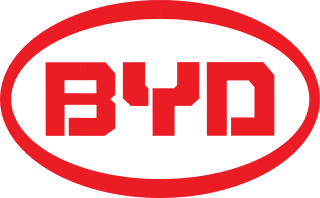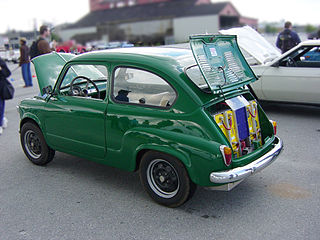Think Global was an electric car company located in Bærum, Norway, which manufactured cars under the TH!NK brand. Production of the Think City was stopped in March 2011 and the company filed for bankruptcy on June 22, 2011, for the fourth time in 20 years. The company was bought soon after by Electric Mobility Solutions AS and production ceased in August 2012 with no more announcements regarding future production. As of October 2010, a total of 2,500 units had been manufactured at Oslo-based TH!NK’s production facility.

An electric vehicle (EV) is a vehicle that uses one or more electric motors for propulsion. It can be powered by a collector system, with electricity from extravehicular sources, or it can be powered autonomously by a battery. EVs include, but are not limited to, road and rail vehicles, surface and underwater vessels, electric aircraft and electric spacecraft.
Tata Motors Limited is an Indian multinational automotive manufacturing company, headquartered in the city of Mumbai, India which is part of Tata Group. The company produces passenger cars, trucks, vans, coaches, buses, luxury cars, sports cars, construction equipment.

Practical electric vehicles appeared during the 1890s. An electric vehicle held the vehicular land speed record until around 1900. In the 20th century, the high cost, low top speed, and short-range of battery electric vehicles, compared to internal combustion engine vehicles, led to a worldwide decline in their use as private motor vehicles. Electric vehicles have continued to be used for loading and freight equipment and for public transport – especially rail vehicles.

BYD Auto Co., Ltd. is the automotive subsidiary of the publicly-listed Chinese multinational manufacturer BYD Company, headquartered in Xi'an, Shaanxi Province, China. It was founded in January 2003, following BYD Company's acquisition of Qinchuan Automobile Company in 2002. The company produces passenger cars, buses, trucks, electric bicycles, forklifts and rechargeable batteries. The current model range of automobiles includes battery electric vehicles (BEVs) and plug-in hybrid electric vehicles (PHEVs), and the company also produced petrol engine vehicles up until March 2022.

In automobile engineering, electric vehicle conversion is the replacement of a car's combustion engine and connected components with an electric motor and batteries, to create an all-electric vehicle (AEV).

free bus is a zero-fare bus system that operates in Greater Manchester. The system was first introduced in Manchester city centre in 2002, with three routes linking the city's major thoroughfares and stations with its main commercial, financial and cultural districts.

Maple is a Chinese automobile manufacturing company based in Fengjing, Shanghai, and a subsidiary of Zhejiang Geely Holding Group.

The Toyota iQ is a city car manufactured by Toyota and marketed in a single generation for Japan (2008–2016); Europe (2008–2015); and North America (2012–2015), where it was marketed as the Scion iQ. A rebadged variant was marketed in Europe as the Aston Martin Cygnet (2009–2013).

A car is a wheeled motor vehicle that is used for transportation. Most definitions of cars say that they run primarily on roads, seat one to eight people, have four wheels, and mainly transport people instead of goods.

An electric car, battery electric car, or all-electric car, is an automobile that is propelled by one or more electric motors, using only energy stored in batteries. Compared to internal combustion engine (ICE) vehicles, electric cars are quieter, have no exhaust emissions, and lower emissions overall. In the United States and the European Union, as of 2020, the total cost of ownership of recent electric vehicles is cheaper than that of equivalent ICE cars, due to lower fueling and maintenance costs. Charging an electric car can be done at a variety of charging stations; these charging stations can be installed in both houses and public areas.

A battery electric vehicle (BEV), pure electric vehicle, only-electric vehicle, fully electric vehicle or all-electric vehicle is a type of electric vehicle (EV) that exclusively uses chemical energy stored in rechargeable battery packs, with no secondary source of propulsion. BEVs use electric motors and motor controllers instead of internal combustion engines (ICEs) for propulsion. They derive all power from battery packs and thus have no internal combustion engine, fuel cell, or fuel tank. BEVs include – but are not limited to – motorcycles, bicycles, scooters, skateboards, railcars, watercraft, forklifts, buses, trucks, and cars.
This is a list of concept vehicles from Toyota for the years 2010–2019.

The Renault Kwid is a crossover city car produced by the French car manufacturer Renault, initially intended for the Indian market and launched in 2015. In 2017, an improved Brazilian version was introduced for Latin American markets. Its battery electric version, named Renault City K-ZE, was launched in 2019, being manufactured in China and exported to Europe since 2021 as Dacia Spring Electric and to Brazil since 2022 as Renault Kwid E-Tech
Kiira Motors Corporation or KMC is a State Enterprise in Uganda established to champion the Development of the Domestic Automotive Value Chain for job and wealth creation and commercialize the Kiira Electric Vehicle Project. The Equity Partners are the Government of the Republic of Uganda represented by the Ministry of Science, Technology and Innovation, Office of the President holding 96% of the initial stock and Makerere University holding 4%.
Keating Supercars was a low-volume kit car manufacturer based in Bolton, England. They made their debut in July 2006 with the launch of the TKR. They built four cars since its launch, the SKR, TKR, ZKR and the Bolt. At the racing car show, Autosport International 2016, Keating Supercars unveiled a road version of the Bolt to be sold in the US. Anthony Keating is the founder and CEO of Keating Supercars and designer of the Keating SKR, TKR and ZKR. Keating was born in Manchester, UK and took a course at the Automobile Engineering institute at the University of Bolton, UK. Keating graduated with an MBA in Business in 2012 and, together with students from the University of Bolton, hopes to build and make the Keating Bolt, the world's fastest production car, reaching more than 300 miles per hour. Keating Supercars plan to sell around 30 cars a year.
Lucid Group, Inc. is an American electric vehicle manufacturer headquartered in Newark, California. The company was founded in 2007. Deliveries of the Dream Edition launch versions were made available to the first group of 20 reservation holders on October 30, 2021.

Fisker Inc. is an American electric vehicle automaker founded by Henrik Fisker and his wife Geeta Gupta-Fisker. Launched in 2016 and based in Southern California, Fisker Inc. is the successor to Fisker Automotive, which produced the Fisker Karma. Fisker Inc. is developing the Fisker Ocean, an electric sport utility vehicle (SUV) with an estimated range of 300–350 miles (480–560 km), with production expected to begin in late 2022. Until 2021, Fisker was working on the development of solid-state battery technologies that could enable as much as 500 mi (800 km) of range with a 1 minute charge.

The Honda e is a battery electric supermini manufactured by Japanese automaker Honda, available in the European and Japanese markets in 2020. It is based on the Urban EV Concept presented at the 2017 International Motor Show Germany in September 2017. The production version was unveiled at the same show in 2019. Unlike the layout of the Urban EV Concept, which was a 3-door hatchback, the production version is available only as a 5-door model. Its name was confirmed by Honda in May 2019. The vehicle is styled with a retro look reminiscent of the first-generation Civic. Honda's stated goal is to solely offer electrified powertrains in all of its mainstream European models by 2022.
SiTech, also known as Xinte Auto, is a Chinese automobile manufacturer headquartered in Changchun, China, that specializes in producing electric vehicles. Gyon is a luxury sub-division of SiTech.













